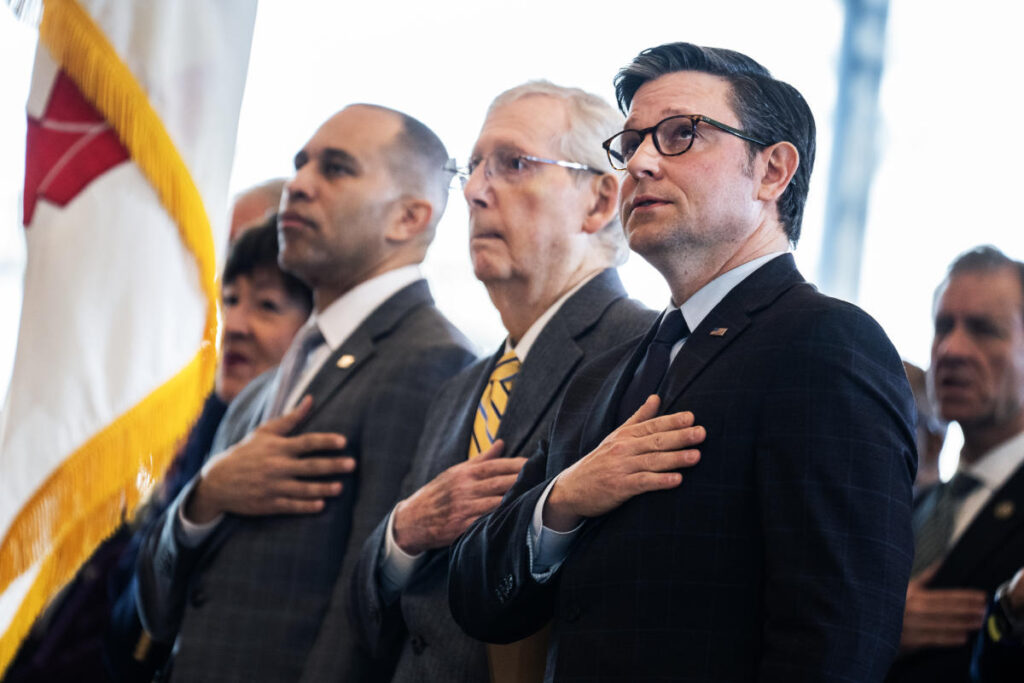Washington's plan to fund the government faces procedural hurdles Friday before it can avert a midnight government shutdown.
The first step narrowly passed just before noon, with the House voting 286-134 to pass a 1,012-page spending bill covering an estimated 70% of the government's discretionary spending. It required a two-thirds majority to pass, but it narrowly passed that threshold amid strong Republican opposition.
The bill aims to fully fund the government until the end of September, marking the final stage in a protracted battle over government funding that has dragged on for nearly six months into the fiscal year.
But the bill could not be passed in the House until more than 112 Republicans, the majority of the Republican caucus, voted against House Speaker Mike Johnson's move to work with Democrats.
In the midst of the discussion, According to Punchbowl News, Congresswoman Marjorie Taylor Greene has previously introduced a motion to remove Johnson from office, but it is unclear when or if the motion will be voted on. In subsequent comments to reporters, she described the move as a “warning” to Mr Johnson.
It's now the Senate's turn when it comes to government funding, leaving open questions about whether procedural delays could delay a final vote this afternoon or evening as lawmakers scramble to meet a midnight deadline. I'm holding it.
Observers then hope it will reach President Joe Biden's desk before the partial government shutdown begins, scheduled for Saturday at 12:01 a.m. ET. Biden has already pledged to sign the bill as soon as possible, and a formal policy statement released Thursday called for swift passage.
“I think some of the people here in the Capitol are beyond fatigue,” Senate Majority Leader Chuck Schumer said on the Senate floor Thursday.
read more: How the government shutdown will affect your money: Student loans, Social Security, investing, and more
One factor that could increase calls across the Capitol for quick action is that both chambers of Congress are scheduled to go into a two-week recess after today's proceedings.
Commitment to borders
But before all members of Congress return home, there is a big task ahead. Funding for a wide range of sectors, including the Pentagon, the Internal Revenue Service, and even the White House and Legislature, will expire at midnight if no action is taken.
The tight deadline is the result of last-minute delays over funding for the Department of Homeland Security, which oversees the border. Other areas of the negotiations are largely in limbo over this final piece of the puzzle.
rear Calls from some Republicans Because the budget process will be used to “dismantle” Biden's border policies, some changes will be implemented at the border, although the final product will be significantly less dramatic. Provisions include new resources for the U.S. Border Patrol and additional detention beds operated by Immigration and Customs Enforcement.
Other highlights of the huge bill include cutting off U.S. government aid to UNRWA, the United Nations' main agency providing aid to the Palestinians, although many of its employees were killed on October 7 in southern Israel. There are accusations that he took part in the attack.
The bill also includes increased federal funding for child care and research into cancer and Alzheimer's disease, among other Democratic priorities.
read more: What will happen to my Social Security payments during the government shutdown?
Provisions for other sectors of government, including agriculture, commerce and transport, have already been agreed and enacted in a separate agreement passed earlier this month.
opposition from the right
The bill is expected to eventually reach Biden's desk, but the key question is how difficult the path will be to get there.
In the House, the high two-thirds threshold needed to pass the bill under a procedure known as a suspension of rules had leaders, especially Republicans, scrambling for a vote. The final close tally came after the influential House Freedom Caucus objected. call invoice “A huge spending bill was drafted in secret and dropped on us in the middle of the night.”
There are many conservatives in the Senate. Rand Paul of Kentucky Tommy Tuberville of Alabama Ron Johnson of Wisconsin also immediately expressed their opposition.
What remains unclear is whether any of them plan to use procedural tactics to delay the final vote. Any senator could voice their dissatisfaction on their own and oppose a time-limited deal, including Democrats who are unhappy with other issues such as insufficient funding for Ukraine. If that happens, the final vote will be pushed back to the weekend and the midnight deadline will be missed.
Either way, even with the partial shutdown taking effect Saturday, Senate leaders could force the bill into law at some point this weekend. This will be long before any significant economic effects are felt when the working week resumes on Monday.
But whether or not the late Friday deadline is met, another brink of a government shutdown could be seen as another attack on the government in the eyes of credit rating agencies.
S&P decided to downgrade the US credit rating in 2011. Last August, Fitch followed up with its own downgrade, citing government dysfunction as the main reason.
Moody's took its own action in November, taking a negative stance toward the United States. He stopped short of being downgraded, but kept his future options open.
This post has been updated with additional developments.
Ben Werschkul is Yahoo Finance's Washington correspondent.
Click here for business and money-related political news
Read the latest financial and business news from Yahoo Finance


